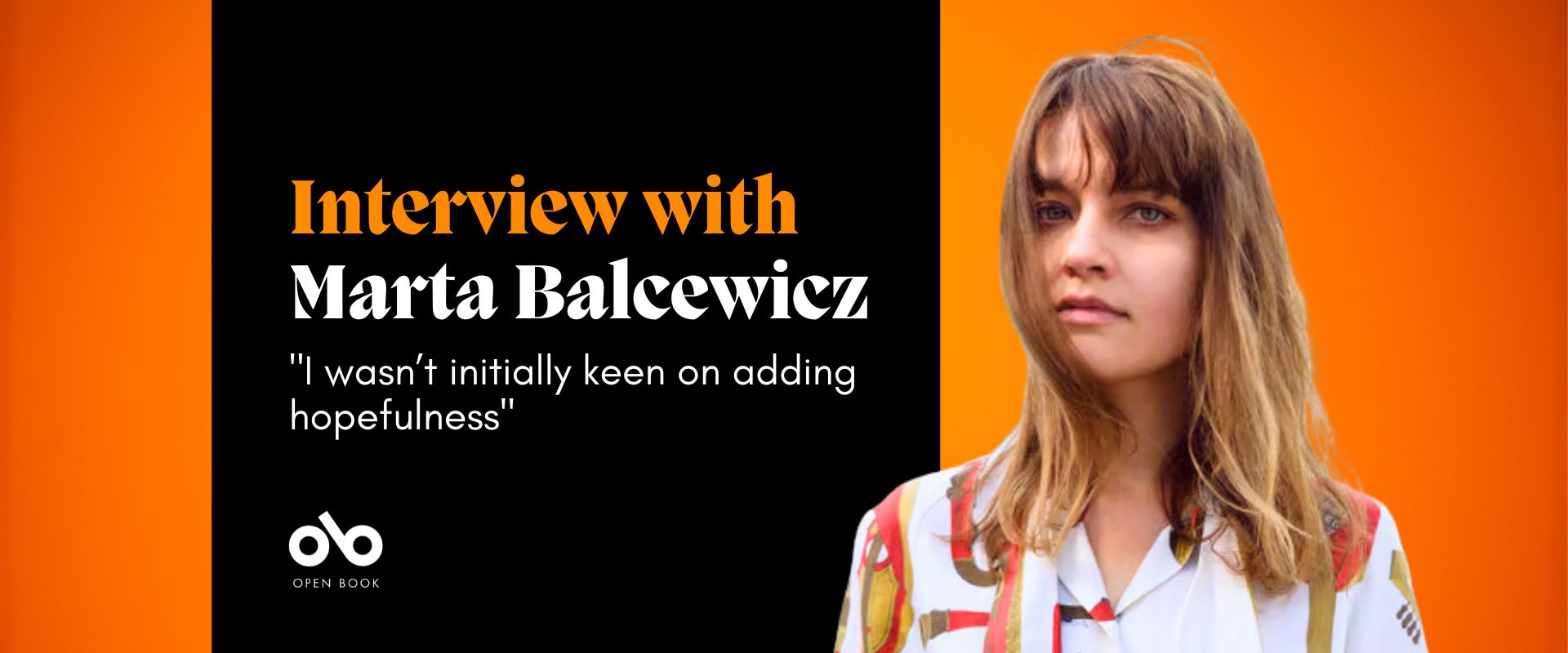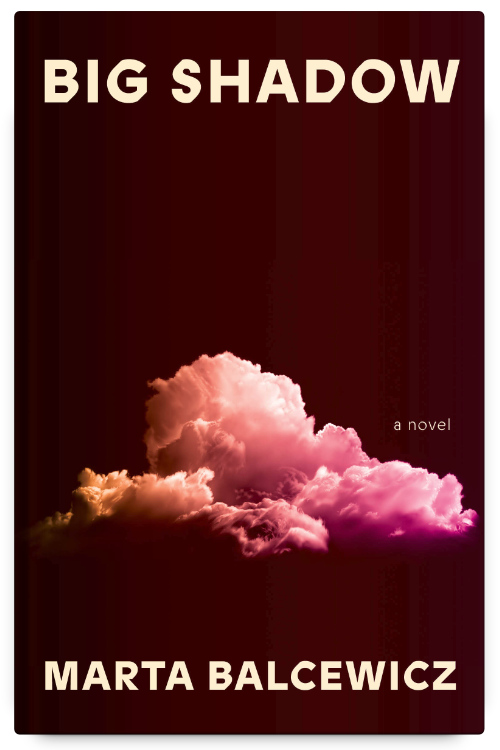Marta Balcewicz on Jim Jarmusch, Rural Peace and Terror, & Her Electrifying Debut Novel
Debut novelist Marta Balcewicz's electrifying Big Shadow (Book*hug Press) is a tale with an indie movie feel, following an isolated teenager desperate to find her way out of a claustrophobic existence. Set in the late 90s in an unnamed town, the story opens on lonely Judy, an aspiring artist whose aching ambition, to be part of and contribute to a larger cultural world, feels brutally out of reach.
Her fearful mother, who lives vicariously through television characters, and her obsessive friends—who are fixated on the titular belief that there is a "Big Shadow" coming—seem to offer less and less for Judy as time goes on.
When Maurice, a visiting summer poetry class instructor and never-quite-was from the NYC punk scene, arrives, Judy pins her hopes to the faded older man who is, given her limited options, the only artistic connection available. Maurice welcomes the adoration and she begins secretly visiting him, hoping to find her way into New York's art scene and growing more and more uncomfortable with Maurice's inexpert and predatory ambassadorship.
A story of power, art, fandom, and growing up, Balcewicz's novel is achingly real, darkly hilarious, and filled with the same raw honesty as Judy's longing. She expertly explores the idea of teenage obsession, the awkward age of not knowing what we don't know, and the pain of growth.
We're speaking with Marta about Big Shadow as part of our Long Story interview series for novelists. She tells us about the film, a cinephile favourite, that first inspired the early versions of Big Shadow, how Toronto makes a sneaky unnamed appearance in the book (and the fast food reference that outed it to one savvy reader), and why she chose to forego both a dedication and an an epigraph.
Open Book:
Do you remember how your first started this novel or the very first bit of writing you did for it?
Marta Balcewicz:
I was initially interested in the idea of a three-person friendship. Specifically, in a friendship comprised of two highly antisocial boys who are best friends and a girl who is the cousin of one of the boys, who is a third wheel, and also — as far as the audience is concerned — something of a moral compass. In all this I was inspired by my favourite film, Jim Jarmusch’s Stranger Than Paradise, which is focused on three people who fit that description, more or less. I was also intrigued by the concept of a city-country divide, and of having the characters be in an isolated setting without adult supervision, which would work to augment their misanthropy and self-aggrandizing tendencies.
So, the first scenes I wrote involved three pompous kids, out in the country, feeling superior to others, but also experiencing some power-dynamic issues among themselves, especially with regard to the third-wheel-girl. I was thinking about novels like Lord of the Flies and Jules Verne’s Two Years’ Vacation—their “boys gone wild” themes. For some reason I was also thinking of Raymond Williams’s The City and the Country and wanted to write a novel version of his ideas. The very first scenes involved the characters basically showing off their snobbery, which I think grew old very quickly.
OB:
How did you choose the setting of your novel? What connection, if any, did you have to the setting when you began writing?
MB:
The novel has three settings: an unnamed city, the rural area outside the city, and New York City.
Your CanLit News
Subscribe to Open Book’s newsletter to get local book events, literary content, writing tips, and more in your inbox
The unnamed city will likely sound familiar to some, especially if they also know that I live in Toronto. There is mention of a large, green university campus with a lot of neo-gothic structures set centrally in town; a major thoroughfare with a repertory cinema on it, and, at least in 1998, a Burger King across the street from the cinema; and the option to head north, to reach more rural areas. A reader recently told me they knew the unnamed city was Toronto based on the Burger King placement, and that was nice.
The personal connection to Toronto/the unnamed city is obvious, then. New York is also an obvious destination for wannabe artists. I’ve never lived in an isolated, rural setting, but I fantasize about that and the peace, though also the potential terror, it would bring. I suppose people who can afford it have second, country homes for that reason – which is what the character in my novel has – to retain the option of returning to the supposed perks of urban living.
OB:
Did the ending of your novel change at all through your drafts? If so, how?
MB:
If I were to glance through all the versions of my ending, they would have only subtle differences. I merely tweaked and adjusted the level of what one commentator called hopefulness. I don’t particularly like neat endings, or the idea of resolution, which to me seems highly suspect and potentially superficial. I wasn’t initially keen on adding hopefulness either, but I’ve come to understand that it suggests a forward momentum that is pleasant to sense, however subconsciously, when one reaches the end of something.
OB:
If you had to describe your book in one sentence, what would you say?
MB:
A novel about three weeks of a young woman’s three relationships: with her childhood friends, her mother, and a new friend whom she starts to secretly visit in New York.
OB:
Did you do any specific research for this novel? Tell us a bit about that process.
MB:
I drafted the first full version of the novel while I was doing an MFA at San Diego State University, whose library has a special archival collection on alternative religions. I did an independent study class, delving into that collection, which contained a ton of fascinating primary source material from all sorts of cults and alternative religious groups. I used this research for the cultish aspects of the novel, specifically, the narrator’s friends’ belief in the coming of the Big Shadow.
OB:
Who did you dedicate your novel to, and why?
MB:
I did not include a dedication in the novel, nor an epigraph. I can’t say why exactly, but I feel partial towards novels that simply start, with nothing to preface them. But if I were to dedicate it – which is to say, the person who the novel is dedicated to in my head – it would be to my partner Adam, who I believe has dedicated all the books he has written to me, in a way that is actually visible when you open their front cover.
____________________________________________________
Marta Balcewicz spent her early childhood in Pomerania and Madrid, and now lives in Toronto. Her work has appeared in Catapult, Tin House online, Vol. 1. Brooklyn, Washington Square Review, The Rumpus, and Passages North amongst other publications. Her fiction was anthologized in Tiny Crimes (Catapult, 2018). She received a fellowship from Tin House Workshops in 2022. Big Shadow is her first novel.






